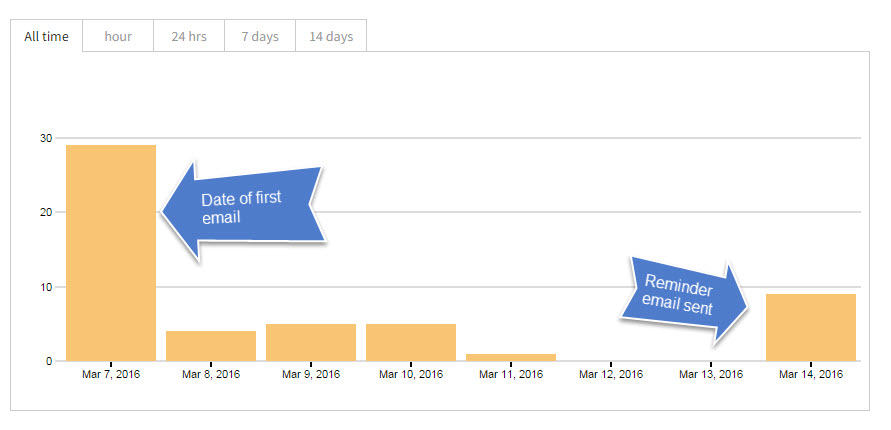Getting a reaction from community mailing lists
We do a lot of engagement via University mailing lists, and on the whole do pretty well in terms of response and reaction. I wanted to share with you a few things I’ve learned over the years in the course of communicating with the communities we support.
Response times
In the last few weeks I’ve been sharing plans for upcoming development work and inviting comment before we commit to development. The timeframe for contributions has been short (2-3 days each time) and this resulted in a small number of complaints that I hadn’t allowed long enough.
This is fair enough, and a valid criticism I take on board. I don’t like to rush people unnecessarily, but in this instance it was a question of grabbing some insight quickly or not doing it at all, unfortunately. And at the end of the day, any insight is better than none.
What I’ve learned over the years is that if you don’t get a response almost immediately you’re unlikely to get much in the following days. In this instance I really did need to work this quickly, but I am confident I wouldn’t have received very much after the initial interest.
This is a pattern across a variety of email communications to web management-related community mailing lists – event promotion, survey invites and service updates. Of course my experience is limited to one medium and one broad group of related communities, but I’ve heard similar anecdotally from colleagues involved in market research in the Communications and Marketing Office.
I haven’t the time to do any significant data analysis, but I do continually monitor the effectiveness of our communications and it pretty much always looks like this example from last week.
So while I unfortunately couldn’t allow sufficient time for some individuals to contribute (and remember I really do want everyone who wants to, to take part) you can see that from a mailing to almost 900 colleagues, we got a very swift reaction from over 150, and from this 11 chose to contribute to the discussion. This example is fairly typical of my experience of working with the web publishing community here at Edinburgh over the last 10 years.
Event promotion reminders
While I’m on the topic of emailing community lists, I thought I’d bring in one further example relating to how we promote our monthly in-person community events. These are really important to me, as I strongly believe that we achieve excellent levels of interest and contribution to consultations like the one above, by facilitating an active community on an ongoing basis. That is, not just leaving the community untended until we want something from them. I believe you’ve got to give, if you want to get…
When we promote events, the booking rate also mirrors this response pattern. If a person hasn’t booked within a day or so of receiving the email, they typically don’t.
What does work though, is a reminder email a couple of days before the event. We do this every month with the Web Publishers Community and while this reminder generally causes a few people to cancel, the overall bookings figure increases by 10-20%.
Tips for effective community engagement via email
So far I’ve talked about patterns in people responding to an email, but not about the email itself. How and what you present has a massive bearing on engagement. Fortunately though, there are a few principles that are easy to follow, and covered in our Writing for the Web training session:
- Know your audience. Write for them. Ensure it’s focused on their needs (not just yours) and uses the same language they do.
- The subject line is critical. Get the key point in there, including what you need them to do
- Cater for on-screen scanning behaviour: open with a summary sentence, use subheadings, highlight calls-to-action
- Keep it short and to the point. Put only the most critical info into the email and provide a trackable link to a location with further detail.
- That way you increase the chance of the reader taking in at least the most important info, and you have a measure of how many are interested in the detail.
Learn more – get help
If you want help with crafting effective emails, or engaging with a user community, get in touch with website support and we’ll do our best to help through the weekly support service.
Contact website support for help on these topics
Our Writing for the Web course covers everything you need to know about how to create content for on-screen consumption
Writing for the Web course details



